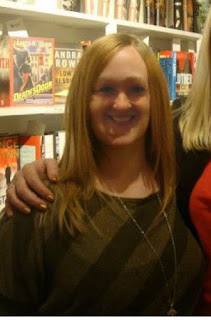YOU. GUYS. *clears throat* I hereby announce that The Unhappening of Genesis Lee is going to be a real, live book! AHHHHHHHH!!
It'll be coming from Skyhorse/Sky Pony Press to a bookstore near you in the fall of 2014. Yeah, that's not a typo. That's NEXT YEAR. AHHHHHHHH!!
Ahem. Now that I'm a little raw from screaming, I'll let Publisher's Marketplace make it all official and real-like.
Basically, it happened like this. After the agony of being on submission (because, yeah. The waiting. The pain. The WAITING.), I heard tell from my agent that a particular editor was really excited about Unhappening, and wanted to talk to her publisher about it. Which of course, put me on pins and needles. I didn't let my phone out of hearing distance, and scrambled for it with every *ding* of an email and every *ring* of a phone call. I was finally starting to calm down a little bit, when my phone rang and Hannah Bowman's name came up on caller ID.
My agent said, "Kristin Kulsavage from Skyhorse has made an offer for Unhappening."
And I said, "BA HA HA HA HA HA!"
Or something like that. Basically, I giggled and said "okay" and "awesome" a lot and didn't really have anything coherent to say. Then I hung up and screamed/laughed and went crazy in the kitchen. I swept up my children, who were eating lunch, and danced around the living room with them. I told my 4-year-old son that my book was going to be a real book you could buy in the store, and told him I was excited.
"Are you excited?" I asked him.
"No," he said. "Who's making the book?"
"They're called Sky Pony."
And THEN, this My-Little-Pony-obsessed boy finally got excited. I'll take what I can get. :)
And then my hubby came home and I screamed and he grinned and hugged me and told me he knew it was going to happen--and he meant it, because he's never doubted me for a single second. And I called up my best friend and we screamed together. And I gleefully ran outside to one of my other best friends, yelling her name, and she took one look at me and shrieked, "Oh my gosh!" and we screamed together. And I emailed my crit group and we e-screamed together.
And then I had to shut my mouth, because I couldn't tell anybody else until the deal was official, and I'd probably told too many people already. After the contract was negotiated, Hannah called to go over it with me, and of course, I had to put her on hold at one point to put on My Little Pony for the Kiddo. Then I signed it and took the contract to a friend's to scan and email it in, and her computer wasn't working. So I drove to Kinko's and realized my wallet was home on my desk. Drove all the way back to get it, and then the machine wouldn't read my card. Nor would it read the first two Kinko's cards an employee used. Then it finally worked, and wouldn't attach the scanned file to the email. Then, with my children yelling and rolling on the floor and getting into paper scraps, FINALLY I got the contract sent. Such is the life of a writer, eh?
And then today, I saw my name pop up in Publishers Marketplace. Which means I again screamed and danced in the kitchen with my family while my husband made waffles, and I can finally scream and dance in public! I can't wait to work with Kristin and Sky Pony, and I can't wait to share my book with the world!
So, my friends, as a thank you to all of you who read my erratic blog posts and cheer me on with comments and write blog posts of your own that I love and who share your writerly or non-writerly friendship in any way, I give you-- THE ULTIMATE NERD CELEBRATION DANCE PARTY. Pick your partners and get your groove on! (But, *ahem* don't touch the Hiddles. He's mine.)
WHEEEEEEEE!
It'll be coming from Skyhorse/Sky Pony Press to a bookstore near you in the fall of 2014. Yeah, that's not a typo. That's NEXT YEAR. AHHHHHHHH!!
Ahem. Now that I'm a little raw from screaming, I'll let Publisher's Marketplace make it all official and real-like.
Basically, it happened like this. After the agony of being on submission (because, yeah. The waiting. The pain. The WAITING.), I heard tell from my agent that a particular editor was really excited about Unhappening, and wanted to talk to her publisher about it. Which of course, put me on pins and needles. I didn't let my phone out of hearing distance, and scrambled for it with every *ding* of an email and every *ring* of a phone call. I was finally starting to calm down a little bit, when my phone rang and Hannah Bowman's name came up on caller ID.
My agent said, "Kristin Kulsavage from Skyhorse has made an offer for Unhappening."
And I said, "BA HA HA HA HA HA!"
Or something like that. Basically, I giggled and said "okay" and "awesome" a lot and didn't really have anything coherent to say. Then I hung up and screamed/laughed and went crazy in the kitchen. I swept up my children, who were eating lunch, and danced around the living room with them. I told my 4-year-old son that my book was going to be a real book you could buy in the store, and told him I was excited.
"Are you excited?" I asked him.
"No," he said. "Who's making the book?"
"They're called Sky Pony."
And THEN, this My-Little-Pony-obsessed boy finally got excited. I'll take what I can get. :)
And then my hubby came home and I screamed and he grinned and hugged me and told me he knew it was going to happen--and he meant it, because he's never doubted me for a single second. And I called up my best friend and we screamed together. And I gleefully ran outside to one of my other best friends, yelling her name, and she took one look at me and shrieked, "Oh my gosh!" and we screamed together. And I emailed my crit group and we e-screamed together.
And then I had to shut my mouth, because I couldn't tell anybody else until the deal was official, and I'd probably told too many people already. After the contract was negotiated, Hannah called to go over it with me, and of course, I had to put her on hold at one point to put on My Little Pony for the Kiddo. Then I signed it and took the contract to a friend's to scan and email it in, and her computer wasn't working. So I drove to Kinko's and realized my wallet was home on my desk. Drove all the way back to get it, and then the machine wouldn't read my card. Nor would it read the first two Kinko's cards an employee used. Then it finally worked, and wouldn't attach the scanned file to the email. Then, with my children yelling and rolling on the floor and getting into paper scraps, FINALLY I got the contract sent. Such is the life of a writer, eh?
And then today, I saw my name pop up in Publishers Marketplace. Which means I again screamed and danced in the kitchen with my family while my husband made waffles, and I can finally scream and dance in public! I can't wait to work with Kristin and Sky Pony, and I can't wait to share my book with the world!
So, my friends, as a thank you to all of you who read my erratic blog posts and cheer me on with comments and write blog posts of your own that I love and who share your writerly or non-writerly friendship in any way, I give you-- THE ULTIMATE NERD CELEBRATION DANCE PARTY. Pick your partners and get your groove on! (But, *ahem* don't touch the Hiddles. He's mine.)
WHEEEEEEEE!

































.JPG)





















